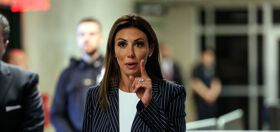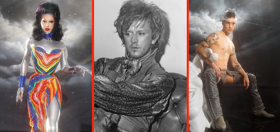
Ilene Chaiken’s not one of those “rich Hollywood folk”. Well, she is, in a way, but The L-Word creator doesn’t like to define herself in such terms. Regardless of how she’d like to be viewed, Chaiken’s undoubtedly one of the movers and shakers in the world of entertainment.
Above you see Chaiken looking quite lipstick as she accepts the GLAAD “Outstanding Drama Series” award for The L-Word, which she also writes and executive produces. Philadelphia-born Chaiken told our editor recently that she didn’t expect the show’s success: “I didn’t think it would happen. Never in my wildest dreams did I imagine that I would do something so successful.” Chaiken also shares her thoughts on motherhood, strife with her parents, Hillary Clinton, DOMA, website spin-off OurChart, product placement and what she once looked for in a man – basically everything!
Before you dive into that jump, however, we think it’s important you know that Chaiken sounds very similar to Sally Field: motherly, benign and familiar. Also, this conversation took place at 9:15am Los Angeles time, which Belonsky thought may be early for Chaiken. One never knows with those rich Hollywood folk!
Andrew Belonsky: Hello, is this Ilene?
Ilene Chaiken: Yes it is.
AB: Hi! It’s Andrew from Queerty.com. How are you?
IC: I’m well, thanks.
AB: Thanks for taking this early morning call – well, early for you, maybe.
IC: Ha! Not really. Where are you calling from?
AB: New York.
IC: Okay.
AB: What time do you get up?
IC: Usually around 5:30.
AB: Oh, god! Why?
IC: Just because – there are so many reasons. It’s always been my good time: my writing time, my work time and I also have kids, so I have to get them off to school!
AB: Right. I was going to come to that. How old are your kids?
IC: I have twelve year old twin girls.
AB: Oh, gosh. And how did motherhood change you?
IC: Oh, God, in so many ways, I don’t know where to begin. Motherhood changes you in a way that every little thing you do is changed – the everyday experience forces you to reach for qualities you… never knew you had.
AB: And you love it?
IC: Mostly I love it, but it’s very challenging. I love my kids madly. I don’t love everything about mothering.
AB: My sister has two little ones and she always complains about having to deal with their classmates’ parents.
IC: There’s a bit of that, but I like most of the people my kids hang out with and I like their families. I think they’re interesting. My children have always been in schools that are comprised of really diverse populations. They’re not just hanging out with rich Hollywood folks, which I think would be odious. They’re spending time with interesting people whom I wouldn’t know otherwise and I actually like that.
AB: Do you consider yourself one of those rich Hollywood folks?
IC: [Laughs] By some definitions. That’s not how I think of myself, but it wouldn’t be completely outrageous for someone to look at me and define me that way.
Chaiken counted singer Ronee Blakely among her first two celebrity crushes. This song’s called “I Need A New Sun.”
AB: Let’s talk about your childhood. Where did you grow up?
IC: I grew up in the suburbs of Philadelphia.
AB: And would you describe your childhood as a happy one?
IC: Is there any such thing?
AB: I don’t know. You tell me.
IC: I’m not going to make any broad generalizations, because I’ve actually met people who have had a happy childhood and it’s not my place to doubt them. I wouldn’t describe my childhood as happy. It wasn’t tragic, but no, it wasn’t a happy childhood. It was reasonably secure.
AB: I imagine like many gay people, you spent your childhood confused and alienated.
IC: I think that was a part of it. I’m sure some of the feelings of alienation had to do with being gay and not knowing. But there are all types of other reasons for feeling alienated.
AB: Who was your first celebrity crush? Do you remember?
IC: It was one of two people, I can’t remember which came first – Lauren Hutton – I had a really big time Lauren Hutton crush – and an actress-singer-songwriter called Ronee Blakely, which was a much weirder crush because she wasn’t anybody that too many people even knew. I saw her in Nashville – it wasn’t a youthful crush, it must have been a college crush – but for some reason I developed a massive, massive crush on her. I started finding out where she was singing and going to all her concerts. I went to RISD and I remember she was playing in Newport Beach, Rhode Island, and I dragged some boy I was dating out to see her.
AB: I take it that relationship didn’t end well!
IC: That relationship never even began! He was just a guy who would do what I wanted him to do!
AB: [Laughs] How old were you when you came out?
IC: I came out when I was twenty-four. I vaguely started coming out a little before that, but I went all through college not out and not dealing with it apart from major crushes.
AB: What spurred you to finally come out?
IC: Misery.
AB: That’s a big motivator.
IC: Misery and attraction – that ineluctable thing that makes you do the thing that terrifies you because you can’t stay away from it anymore.
AB: It was terrifying for you to come out to your parents?
IC: I didn’t come out to my parents until I was in a relationship.
AB: Were they supportive?
IC: Uh, no. Not to begin with. We had a long period of discord and a slow evolution of acceptance. You know, my parents are liberal Jews, they’re life long Democrats with reasonably progressive ideas, but they still weren’t prepared to have a gay kid and they were pretty upset about it and they said all the wrong things and some vile things. Over the course of time, they became a little more accepting, but the thing that made them fully accepting was having grandchildren.
AB: How do your parents feel about your career trajectory?
IC: They’re mystified by it – and delighted.
AB: Do they watch The L-Word?
IC: And they watch The L-Word! They now live in Tuscon – I grew up in Philadelphia, but for some reason my parents moved to Tuscon, but they found their community, they have their friends and a real community and they all watch The L-Word together and talk about it.
AB: That’s so cute.
IC: Cute and horrifying!

Chaiken with Pam Grier and Marlee Matlin at The L-Word’s fifth season premiere.
AB: Did you imagine that The L-Word would become so big?
IC: No. Well, I can’t say that I didn’t imagine it, but I didn’t think it would happen. Never in my wildest dreams did I imagine that I would do something so successful. I never could have predicted or envisioned what’s happened with this particular show.
AB: What’s interesting isn’t just that The L-Word draws so many viewers and continues to grab headlines – you’re on the fifth season now?
IC: We’re on the fifth season and you’re exactly right: we’re still getting a lot of attention. The show’s actually building. The audience for the show particularly this season has grown immensely.
AB: Let’s talk about OurChart. Tell me about how this project came about – your reasoning.
IC: The story of how it came about as opposed to why it exists is slightly different. How it came about is that it was a story we started telling show – it wasn’t calculated, I didn’t say, “I have this business idea, let’s set it up in the show so that I can use the show to promote the idea”.
AB: That would have been very clever, though.
IC: It might have been clever, but it would have been…
AB: Disingenuous?
IC: Yeah, it would be, but I think you have to be true to your characters and the universe of your show and not exploit them in that way. It creates an inauthenticity. It doesn’t take away from the fact that after the fact a lot of people have accused me of doing that, which is fine. But, anyway, Alice had her chart from the very beginning. It’s the central motif of the show and we’ve always played with it. In every season we’ve talked about what’s going to happen with Alice’s chart, as if it’s a character and I think it was our third season, she put it online and it started to grow. She even said at one point, “Oh my God, it’s like a lesbian MySpace”. As we’re starting a new season, I always sit with the folks at Showtime and talk about business opportunities that are coming out of the show, where can we look to make deals this year, where might we do product placement… And I pitched really just casually the idea that, “You know what? This thing that Alice has done is kind of cool, maybe we should try a lesbian social network”. And at that moment in time I think the social networking phenomenon was just taking off and Showtime and CBS said, “Very interesting idea. Try it”. And so we did.
AB: And it’s been successful?
IC: It has been successful. It’s really growing. There’s this interesting synergy between our website and the show. Our web traffic spikes when The L-Word is on the air, as does the traffic of pretty much every other site where people talk about the show. But, I also think that the show’s fortune’s have been affected by the website. We kept it alive all year long, we talked to our audience, we did some things that they asked for and we had a dialogue with them and many more people came to the show this year than had the previous year. I think that has a lot to do with keeping this community alive and interactive.
AB: You were talking about how you sit down with the Showtime and chat about product placement. Does the business aspect of the show – does that sully your creative process at all?
IC: No, it doesn’t in the least. I think it’s interesting and I’m sure there are some writers who wouldn’t be interested, but I’m not one of those people. I don’t like business so much – I’m not a business woman – but I like the sociology of what we’re doing. I think it’s really important and it’s exciting. And it’s exciting that there are advertisers who now want to be in business with our community and have identified us as desirable and economically viable. It’s exciting to think about what other ways we can get our stories out there.
AB: Let’s switch gears and talk about politics. I know that you are involved in helping Hillary Clinton win the presidency.
IC: I’ve been a Clinton supporter for a longtime. I’m hopeful and excited about our Democratic nominee. Whether it’s Clinton or Obama, I think we’re going to have a great nominee and I’m going to work for whoever it is… I talk that way now as we’re getting closer. I’m not presuming that it’s over for Hillary Clinton, but I’m well aware of where it is right now and the fact that Obama is definitely looking more like a winner. You know, I just think that we have two candidates who are going to change the course of things in a powerful and positive way and I’m going to work hard.
AB: What’s the main attraction of Hillary Clinton for you?
IC: For me Hillary Clinton has always been a bold and smart and capable politician. I won’t say that it doesn’t have something to do with the fact that she’s a woman – for me, that’s really significant. I think that a lot of the things that have been said and a lot of the ways she’s been judged and characterized, particularly the negative, have had to do with the fact that she’s a woman and that galvanizes me even more.
AB: Last week, we published interviews with three gay Obama supporters – Tobias Wolff, Eric Stern and Stampp Corbin. Corbin talked about how he doesn’t agree with Hillary Clinton’s “strategic” position on DOMA. He thinks we’ve progressed so far and sees no reason to leave bits in place to prevent the passage of a Federal Marriage Amendment. What is your stance on DOMA and Hillary’s partial repeal?
IC: I wish that she had been bolder in her support of us and our issues. That’s just the state of our politics – we’ve been supporting candidates for years who take small steps and then really disappoint us. I’m not a single-issue voter. I have a hard time supporting anybody who doesn’t fully support us in our lives, but I’m pragmatic. I really think that all of America will respond to leadership. Even if there are people who vehemently disagree with us, who are bigots, who would like to see us oppressed, there is just no question that coming forward, leading and doing the bold thing is the better approach. So, I hope that either Clinton or Obama, when running for president, will be bold in their support of us and our issues.




















Rangdrol
This is the coolest show ever! I’m so happy the girls have got their own show! Makes me proud, now come on guys!!
bnd
quero que carmem volte para shane ela vazia a tela sair fogo
Jay
The L word should continue even beyond the sixth season. I am the author of Butch and Butch II, now revised into one book, and I can say that the impact Butch has had on so many women, particularly young women, is both amazing and sad. One wrote that I kept her from suicide; another that antidepressants were her only relationship before she read the books. If there is a way for L word to continue, I will support it.
marcia
why steel the pregnant man stuff from the news, when you write so much better.
ashley
hello i wish i could email you personally i hope you get this my name is ashley i am a 21 year old lesbian and i loved the l word it has come to my attention that there is going to be a spin off and i think i would be a great addition to your new show i would love to try out please please contact me my email is [email protected] thank you so much
thank you, ashley
rebelgirl
HI,
I HAVE WROTE A TRUE STORY ABOUT A LITTLE GIRL WHO PASSED THROUGH HARD MOMENTS IN LIFE AND AT THE END SHE WAS A LESBIAN.IF YOU ARE INTRESTED IN KNOWING MORE ABOUT THE STORY FEEL FREE TO CONTACT ME.THE STORY IS VERY INTRESTING,IT HAS ALOT OF THINGS THAT MANY PEOPLE COULD BE PASSING THROUGH LIFE. [email protected]
lisa
Thank You-the lword has been an amazing series and helped me more than i can say over the past six yrs, in coming to terms with my sexuality and feeling good about who i am..i am so disappointed that the lword has finished!
i agree that season 6 was a bad ending…alice the killer?…soooo unlikely!…and tinas confession that is just not right! absolutely ruined tinas character! and i was so happy tina and bette made it…i could so realte to being in love with my first gf and never having been with another woman..
why would shane have burnt her business down?…then swear off dyke drama?…doesnt make sense…and why would she not go after molly now she knows…it is a rather a disappointing finale to a fantastic series…
why did it have to become so far fetched and finish..surely it could have run for years with good story lines…days of lives is crap and has run for too long…but its still going…whats with that?!? six seasons only?
perhaps ilene feels she has done enough..pity no one else stepped up as she hoped.. perhaps she could develop the cageny and lacey idea further herself or other similar shows…lol
i dont think she made a mistake with the dana story even though it was v.sad it raised alot of awareness and money for very worthy causes..
i dont agree with the negative reviews about ilenes work..i think she is very talented indeed…i am just left with numerous questions none of whichi like to speculate about…
i dont have stories or ideas..just a please fill the gap that is now missing with no lword to look forward to…